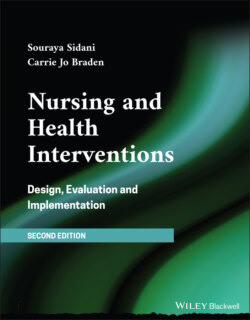Читать книгу Nursing and Health Interventions - Souraya Sidani - Страница 68
Review of Reviews
ОглавлениеMany types of literature reviews are useful in developing a comprehensive understanding of the health problem. These are well described by Snilstveit et al. (2012), Paré et al. (2015), and Hong et al. (2017). Of interest to the generation of an understanding of the health problem are reviews that synthesize theoretical or conceptual knowledge and quantitative and qualitative empirical evidence related to the problem experience and its associations with determinants.
Theoretical or conceptual reviews are exemplified with concept analysis (Hupcey & Penrod, 2005) and framework synthesis (Carroll et al., 2013). Essentially, these consist of reviewing theoretical, empirical, and sometimes grey literature, for the purposes of: clarifying the attributes of the health problem; defining it at the theoretical and operational levels and distinguishing it from related concepts or problems; and identifying its determinants.
Quantitative reviews include systematic reviews, meta‐analyses, and umbrella reviews that focus on the relationships among determinants and the health problems. The reviews apply a systematic process for searching the literature; identifying and selecting studies that meet the pre‐specified criteria; appraising the study quality; and extracting data on the existence, direction, and magnitude of the associations between the determinants and the problem. However, they differ in the method for synthesizing the evidence. Systematic reviews use vote count or content analysis to integrate evidence on the associations. Meta‐analyses use statistical techniques to estimate the direction and magnitude of the association reported in each study; to determine the extent of variability in the estimates across studies. When the variability is minimal, the estimates are synthesized to indicate the average level of associations between the problem and its determinants. Where there is high variability, statistical tests are used to identify conceptual and/or methodological factors that account for the observed variability in the estimates. Recently, umbrella reviews (also called reviews of reviews, meta‐reviews or meta‐evaluation/meta‐epidemiology; Gough et al., 2012) have been conducted to compare, contrast, reconcile, and/or explain differences in the results of systematic reviews and meta‐analyses (Paré et al., 2015). Findings of systematic reviews, meta‐analyses, and umbrella reviews indicate: the extent to which the associations between the determinants and the health problem exist within particular client populations and contexts, or are replicated across populations and settings; the expected direction and magnitude (or size) of the associations; and the factors that moderate the associations.
